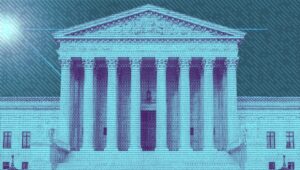President Joe Biden’s student loan forgiveness plan has been blocked by the United States Supreme Court.
The Court ruled 6-3 that a federal law enacted in 2003 does not allow Biden to delete $430 billion dollars of student loan debt.
“The text of the HEROES Act does not authorize the Secretary’s loan forgiveness program. The Secretary’s power under the Act to ‘modify’ does not permit ‘basic and fundamental changes in the scheme’ designed by Congress,” stated the Court in the opinion released on June 30. “The authority to ‘modify’ statutes and regulations allows the Secretary to make modest adjustments and additions to existing provisions, not transform them. Prior to the COVID–19 pandemic, ‘modifications’ issued under the Act were minor and had limited effect. But the ‘modifications’ challenged here create a novel and fundamentally different loan forgiveness program.”
Chief Justice John Roberts authored the majority opinion, joined by Justice Clarence Thomas, Samuel Alito, Neil Gorsuch, Brett Kavanaugh, and Amy Coney Barrett, who filed a concurring opinion. Justices Elana Kagan, Sonia Sotomayor, and Ketanji Brown Jackson were in the minority.
The federal government argued that Secretary of Education Miguel Cardona, who was nominated by Biden at the beginning of his term, had the authority to sign off on a national student loan debt relief program under the Higher Education Relief Opportunities for Students Act of 2003. Cardona invoked the act in 2022 in response to the COVID-19 pandemic.
Individuals with incomes of $125,000 or below in 2020 or 2021 were granted $10,000 of student loan forgiveness while Pell Grant recipients could receive up to $20,000 of loan forgiveness.
“Under the Government’s reading of the HEROES Act, the Secretary would enjoy virtually unlimited power to rewrite the Education Act,” wrote Roberts.
“Common sense tells us that as more indicators from our previous major questions cases are present, the less likely it is that Congress would have delegated the power to the agency without saying so more clearly,” wrote Barrett. “Here, enough of those indicators are present to demonstrate that the Secretary has gone far ‘beyond what Congress could reasonably be understood to have granted’ in the HEROES Act.”
The forgiveness program was challenged by six states – Nebraska, Missouri, Arkansas, Iowa, Kansas and South Carolina – and the Eighth Circuit Court issued a preliminary injunction. The Court found Missouri has proven standing to challenge the federal government because the plan would cost MOHELA — “a nonprofit government corporation created by Missouri to participate in the student loan market” — approximately $44 million annually.
Kagan said the majority had “departed from the demands of judicial restraint” by ruling in favor of “a party that has suffered no injury” and argued that neither Missouri nor the other states had been injured by the Department of Education Student loan forgiveness plot.
“The majority’s opinion begins by distorting standing doctrine to create a case fit for judicial resolution. But there is no such case here, by any ordinary measure,” he added.
“We do not mistake this plainly heartfelt disagreement for disparagement. It is important that the public not be misled either. Any such misperception would be harmful to this institution and our country,” noted Roberts.
While campaigning for the presidency, Biden promised to forgive a “minimum” of $10,000 in federal student loan debt.
“Young people and other student debt holders bore the brunt of the last crisis,” tweeted Biden on March 22, 2020. “It shouldn’t happen again.”
American student loan debt totals more than $1.774 trillion as of June 2023, according to Education Data Initiative. Roughly $1.64 trillion – or nearly 93% of all student loan debt – is outstanding federal loan debt. Just over 43 million people took out student loans from the federal government with an average debt balance of $37,717.
To pursue a bachelor’s degree at an average American public university, a student typically takes out a loan of $25,969.

